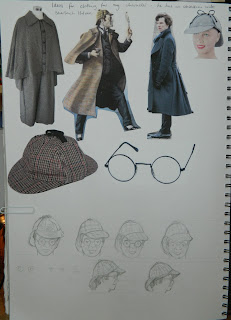For this exercise
we had to create a character possibly from a book /story or based on an
archetype.
archetype |ˈɑːkɪtʌɪp|
noun
1 a very typical example of a certain person
or thing: he was the archetype of the old-style football club chairman.
•
an original which has been imitated; a prototype: an instrument which was
the archetype of the early flute.
2 Psychoanalysis
(in
Jungian theory) a primitive mental image inherited from the earliest human
ancestors, and supposed to be present in the collective unconscious.
3 a recurrent symbol or motif in literature,
art, or mythology: mythological archetypes of good and evil.
DERIVATIVES
archetypical |-ˈtɪpɪk(ə)l|adjective,
archetypically adverb
ORIGIN
mid
16th cent.: via Latin from Greek arkhetupon ‘something
moulded first as a model’, from arkhe-
‘primitive’ + tupos ‘a model’.
Firstly, I collected several images from the internet,
magazines and newspapers.
I catalogued these images under the headings : Men over
60, Women over 60, babies and toddlers, Children, Men under 60, Women under 60
and sportsmen/women.
Using these images, I decided to create a character
from a childrens story I have in mind called ‘Simon Supersleuth’.
The basic outline for the story is : A teenage boy from
London, is evacuated to his aunt and uncles farm in rural Dorset, during the
second world war.
While there he meets two other evacuees, and with these
two new friends he embarks on an adventure of espionage and intrigue.
One character from my story is the aunt, a jolly,
friendly, rosy cheeked farmers wife, who likes to cook for her new family.
I wanted this character to be physically, a little on
the plump side, so after drawing out some initial sketches I experimented with body shapes.
When I had done these, I decided to explore more of
what womens fashion may have been like during the 1940’s, including images of
housewives clothes and hairstyles.
Finalising the character, I drew three views, front,
back and side to give an overall impression, then I coloured it with acrylic
ink, and left a pencil outline to give the drawings more structure.
The next character I chose to design, was the title
character, Simon Supersleuth.
Obviously I needed more period images, particularly of
evacuees, to get an idea of the clothing they would have worn.
Many of the evacuees would have come from poor inner
city families, so their clothes would have been, tatty and worn, or possibly
dirty.
In the story, Simon has an obsession with Sherlock
Holmes. This obsession has grown out of
the fact he has watched many Basil Rathbone films at the local cinema, where
his mother works as an usherette.
When he is evacuated to the farm he finds some old
clothing in a trunk belonging to his uncle, including a deerstalker hat and a
long coat.
I added round
spectacles to give the impression of being smart/clever, and most importantly
the deerstalker hat.
Once I was happy with the facial features, I drew
simons character in the three views, front side and back, making sure I drew in
guidelines, to help me replicate certain features.
When this had been done, I coloured the sketches with
acrylic ink as I had done with the previous character.
Overall I am pleased with both of the characters I have
created, but this may not be the final design for them, as they may change as
the story is written.
It has been good to work through the process of
designing theses characters as I have been able to see what they could look
like.
Artist I have Looked at:
Bryan Hitch – A
British comic book artist, concept artist and character designer, who began his
career working for Marvel UK, before progressing onto American titles for
D.C.Comics and the American Marvel Comics.
Bryan broke into
comics at the age of 17 after he submitted an ‘Action Force’ story he had
written and drawn himself to Marvel UK, using a style that was popular at the
time.
He has worked for
the BBC on the relaunch of Dr Who as a concept artist in 2005, and he also
contributed designs for Spocks starship in the 2009 film Star Trek.
Bryan was a
character design artist for the Ultimate Avengers (1 and 2) animated films, and
also the video game, ‘The Incredible Hulk: Ultimate Destruction’.
I like his work
for the amount of detail he puts into his drawings, and how his character
designs, and scenarios leap out of the page at you.

















No comments:
Post a Comment